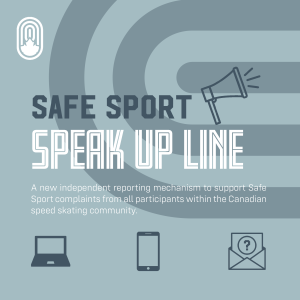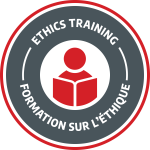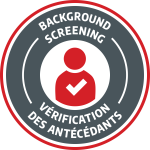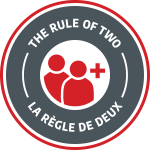SAFE SPORT
COMMITMENT TO SAFE SPORT
Speed Skating BC embraces our responsibility to create, foster, and preserve sport settings that ensure positive, healthy, fun, and fulfilling experiences for all individuals. We believe that a Safe Sport environment prioritizes the welfare, safety, and rights of every participant at all times.
Speed Skating BC is committed to providing Safe Sport Training to all Coaches, Officials and Volunteers purchasing a SSBC membership. SSBC will offer the training through the Safe Sport Training Module developed by the Coaching Association of Canada. The training will be mandatory for all members in a Position of Authority, as referenced by the BC Universal Code of Conduct to Prevent and Address Maltreatment in Sport (BCUCCMS). The completion of this course will be recorded as part of SSBC’s registrations system, IceReg, to ensure completion.
Safe Sport training was developed to help anyone involved in sport — whether you have direct contact with skaters or work in the background — to promote physical, psychological, social and spiritual health, in line with the Universal Code of Conduct and BC’s Universal Code of Conduct to Prevent and Address
Maltreatment in Sport.
Speed Skating BC’s extensive organizational policies reflect our commitment to Safe Sport. Our aim to uphold the values of Safe Sport is incorporated in our Code of Conduct, Bullying and Harassment, Equity and Access, Concussion and Human Resources policies.
Adopted and Ratified – May 2021
Speak Up Line

The Safe Sport Speak Up Line, is an independent reporting mechanism through IntegrityCounts that supports intake and management of complaints from participants of speed skating in Canada, including those involved at the national, provincial/territorial and club levels.
Safe Sport framework
Speed Skating BC’s Safe Sport framework is based on 3 pillars: Awareness, Prevention and Action. We invite you to learn more through the following resources.
AWARENESS
What is Maltreatment?
Maltreatment refers to an action or lack of action that results in harm or has the potential for physical or psychological harm.
Resources:
Concussion prevention, recognition and return to sport protocols have been heavily featured in the media over the past few years. Please see the SSBC Sport Injury Management Guidelines for the concussion protocol that must be followed at all SSBC practices and competitions.
PREVENTION
Speed Skating is a fast and exciting sport. Preventing injuries through proper safety equipment is everyone's responsibility.
Speed Skating Arena Safety Checklist
For more information please contact BC Speed Skating's Executive Director
The Responsible Coaching Movement (RCM) is a call to action for sport organizations, parents, and coaches to enact responsible coaching across Canada – on and off the field.
- Speed Skating BC is encourages the use of the Rule of Two to ensure a safe environment for all.
- Refer to the Employee & Volunteer Screening Policy (see tab)
- Enroll in the Coaching Association of Canada's Safe Sport Course.
The goal of the Rule of Two is to ensure all interactions and communications are in open, observable, and justifiable settings.
As a volunteer, coach or official with SSBC we want ensure you are aware of and follow the Rule of Two. Essentially, two responsible adults (a coach, staff, parent, or screened volunteer) are present with a participant. There may be exceptions in emergency situations.
To learn more about the Rule of Two go to the Coach.ca website or take the eLearning Module in the Locker.
As part of our Values, BC Speed Skating believes it is our duty to maximize each member’s potential for growth and development. Recognizing our members in a wholistic way, where sport is part of personal development, creates a supportive a growing community.
This philosophy is used in our skater, officials and coaches development pathways and in our planning processes.
For more information contact our Technical Director.
All BC Speed Skating Board and Staff must complete the Commit to Kids Program through the Canadian Centre for Child Protection.
The Commit to Kids (C2K) for Coaches online training empowers coaches and other sport leaders with practical information to help them enhance child and youth safety in sport. It highlights the importance of understanding boundaries, sexual misconduct and reporting inappropriate behaviour.
This online training consists of eight separate modules that address the following:
- child sexual abuse
- the grooming process
- handling disclosures of child sexual abuse
- the impact of child sexual abuse
- creating a Child Protection Code of Conduct for your organization
- policies and procedures to use to protect children in your organization
- the C2K program for child-serving organizations
A certificate of completion will be issued upon completion of all modules and a successful knowledge validation test.
All Coaches and Officials must complete the Coaching Association of Canada's Safe Sport Training module.
ACTION
Speed Skating BC's Code of Conduct outlines the behaviour expectations for members of our association.
Code of Conduct - Full version
Code of Conduct for Athletes
Code of Conduct for Officials
Code of Conduct for Coaches
Code of Conduct for Board_Committee Members and Staff
Code of Conduct for Volunteers
Code of Conduct for Parents and Guardians
What is Harassment and what to do about it? The following document will outline Speed Skating BC's policy.
For more information contact the Executive Director.
BC Speed Skating's Conflict Resolution Process can be found in our Policy and Procedures manual on our Governance page.
BC Speed Skating's Incident Reporting Process can be found in our Policy and Procedures manual on our Governance page.
How to report maltreatment
You can report a complaint about a violation of the B.C. Universal Code of Conduct directly to the BC Speed Skating Executive Director or President.
You can report any concerns or complaints about any sport organization in B.C. or Canada to the National Sport Helpline (1-888-83SPORT, or www.abuse-free-sport.ca)
Other resources:
• B.C. Helpline for Children – a confidential toll-free phone line for children and youth wanting to talk to someone – is 310-1234 (no area code required).
• VictimLinkBC is a toll-free, confidential, multilingual telephone and online service available across B.C. 24 hours a day, 7 days a week which provides information and referral services to all victims of crime and immediate crisis support to victims of family and sexual violence.
• Resilience BC: Anti-Racism Network provides information about how to report incidences of racism and hate crimes if you are a victim or witness such incidences.
BC Speed Skating's Discipline and Arbitration Process can be found in our Policy and Procedures manual on our Governance page.


